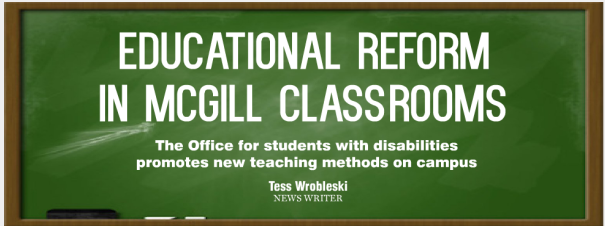
Frederic Fovet became the new director of McGill’s Office for Students with Disabilities (OSD) in 2011. His direction of the OSD reflects a broader paradigm shift in the way educational institutions across North America approach disability. In effect, the OSD has shifted from a medical model of disability to a more social model. Now, they are starting to take action to reform both services on campus and the classroom.
The social model of disability states that a disability is not a problem inherent to the individual, but rather something that stems from how the environment is designed. “The social model recognizes that just as our physical environment is designed for the “able-bodied,” our educational curriculum is designed for the “average student,” or one without physical or mental disabilities,” explained Tanja Beck, the Access Services Advisor for the OSD.
Over the past 10 years, the number of students seeking accommodations from the OSD has increased dramatically. In addition, there has been a shift in the reasons students have for registering with the office, with the majority of students seeking accommodations for “invisible disabilities,” such as mental illness, learning disabilities, or ADHD, rather than physical handicaps. In fact, mental health issues such as anxiety and depression are the most common disability among students registered with the OSD.
As a result of this changing dynamic, the OSD has recognized that the current system of accommodations for all of the registered students is no longer a sustainable practice. Currently, the OSD must provide separate accommodations for every student registered with the office, for each of their classes, for every separate term. By altering the university environment, the OSD hopes to effectively and efficiently reduce barriers to learning without needing to provide separate accommodations for each student.
This aspect of their mission can be seen in the OSD’s promotion of the adoption of the Universal Design for Learning Principles (UDL) in McGill classrooms. UDL is a teaching approach that encourages professors to use multiple means of representation, expression, and engagement when presenting and assessing course material. In this way, the classroom is made more accessible to different learning styles.
The Office for Student’s with Disabilities at McGill offers UDL workshops for faculty staff and students, as well as one-on-one consultations with professors and TAs. In meetings with OSD faculty, professors will receive suggestions for UDL tools they may find effective in their classrooms.
Professor Hans Beck of the History and Classical Studies department is a leading figure for the use of UDL principles at McGill. “I started easy, with the implementation of some basic principles such as accessible class notes, powerpoint presentations that are made available before class, and revised regulations for the submissions of assignments,” Beck commented. “This is nothing really earthshaking, but the sum of these minor steps really allows students to connect to the curriculum in a different way.”
Since then, he has experimented with an “inverted classroom.” This requires that students listen to a lecture outside of class and then write homework assignments or engage in some type of learning activity during the class period. Professor Beck noted that this alternative learning style was at first met with confusion and resistance, but students gradually grew more comfortable with the new learning environment, and even come to enjoy it.
McGill is joined by four CEGEPs in Quebec– Centennial College, Dawson College, John Abbott, and Marianapolis– in a project examining the implementation of UDL principles in higher education institutions. The project will help identify both the challenges and benefits of UDL in classrooms and student services.
Angela Bourgos, Head of School at Centennial College, is a strong proponent of UDL. “UDL is a learning for the 21st century,” she asserted. “It is most effective for students with learning challenges, but everyone benefits. It requires teachers to design courses with learning in mind, not just teaching.”
Cederic Ferland, U3 Cultural Studies, works for the OSD creating videos that explain and promote UDL principles to the McGill community. The videos offer student, faculty, and staff perspectives on the benefits of UDL and its potential to enrich the learning experience at McGill.
Ferland is currently enrolled in a class (MUPD 204) that meets in an Active Learning Classroom. In an Active Learning Classroom, the classroom includes round tables and numerous computer screens linked to the professors’ computer. The layout of the classroom facilitates interaction between the students and the professor, as well as among the students themselves. Ferland describes the experience as positive, productive, and even fun, but recognizes that while the system works well for the 16-person class, it may not be conducive to a larger class size.
In May of next year, the OSD will offer workshops for students on how to start a conversation with course instructors or professors about UDL. These workshops will be open to students with and without disabilities. “Talk to your professor if you experience certain barriers in accessing course material, and raise awareness of what might create barriers in the classroom,” Beck encouraged. “We need student allies to push UDL and move the idea forward.”
Beck sees a bright future for UDL at McGill. “I think the more faculty is asked by students to provide more access when it comes to their courses, the more they’ll see the need for education reform. The more this message comes from the students, the stronger it speaks.”







